Pulling no Punches
Mark Wainberg's impolite war against AIDS
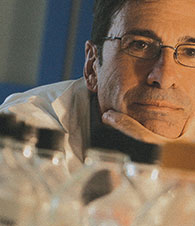
Christine Muschi
Mark Wainberg, BSc'66, is not an easy man to intimidate. During his years as president of the International AIDS Society, he grew used to dealing with power-happy politicians as well as activists, the media and senior executives of drug companies. So in 2000, having been asked to lecture in Nairobi, Wainberg decided he wanted to talk to the longtime president of Kenya, Daniel arap Moi, and through a personal contact, he arranged a meeting. Moi — a giant of a man, famous for his crushing handshake — did not expect to be told off by a slight, scholarly-looking scientist from Canada.
"He was notorious for not speaking out about AIDS," Wainberg recalls now. He is sprawled across an armchair in his spacious office at the Lady Davis Institute of Montreal's Jewish General Hospital; three desks and a table contain a profusion of papers and no fewer than 14 coffee mugs. "He preferred to avoid the subject. But his people were getting infected at a very high rate. So I said to him, 'Mr. President, you have to be more outspoken. You have to speak about the need for condom usage. We cannot put our heads in the sand and pretend that young people in Kenya are not getting infected by HIV.'"
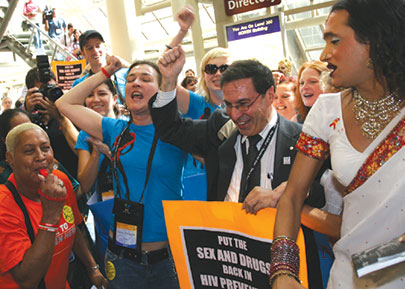
While at the International AIDS Conference in Toronto in 2006, Wainberg took part in a demonstration by sex trade workers seeking better protection against HIV infection
Lise Beaudry
Moi was but one of many world leaders to receive the Wainberg treatment: a steely, unabashed insistence that the scourge of AIDS requires government leaders to face the issue head-on. One of the proudest moments of his life occurred in the same year as the Kenya visit, at the end of a huge international AIDS conference in Durban, South Africa. That country's president, Thabo Mbeki, had claimed that AIDS is a disease of poverty, not caused by HIV and not treatable by retroviral drugs; some of Wainberg's fellow researchers were so upset that they wanted the gathering moved elsewhere. But Wainberg insisted it should stay in South Africa. And at the closing ceremony, former president Nelson Mandela — a personal hero to Wainberg — publicly repudiated Mbeki's stand.
Wainberg, who has taken part in many public scraps over the years, knew that accurate information, widely understood by the general public, is essential to the fight against AIDS. He already grasped the importance of the press. On that trip to Kenya, he received a firsthand lesson in the importance of a free press.
"The day after I met President Moi," he explains, "I was in the airport at Kisumu, a city on the shore of Lake Victoria. I happened to be sitting next to a Roman Catholic priest and I noticed that one of the national newspapers had my picture in it. I got up, took a copy of the paper, and read the article. And it said, 'Professor Mark Wainberg, president of the World AIDS Society, tells the president that young people must abstain from sexual relations in order to prevent the spread of AIDS.'
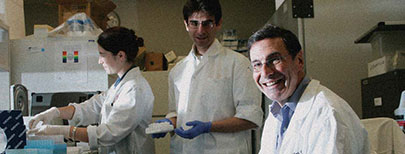
Wainberg with internal medicine resident Liz Beauchamp, MDCM'06, and postdoctoral fellow Jorge Martinez
Christine Muschi
"I was aghast. I went back to my seat and I found the priest had the paper too. He looked at me and said, 'Excuse me, sir, is this you sitting next to the president?' 'Yes, it is,' I said. He said, 'Sir, I must congratulate you. You are the only person telling the truth about AIDS.' It was a surreal moment. It was so bizarre. But I didn't want to get into a fight in the airport, so I thanked him."
It was one of the rare occasions in his professional life when Wainberg chose to back down. There have been other occasions when his tongue has got him into trouble. After the late journalist and author Nicholas Regush published a book called The Virus Within, pouring scorn on the belief that HIV causes AIDS, Wainberg was so furious that he told Maclean's magazine, "Regush is the equivalent of a murderer. There are people who will be taken in by his half-truths and may die of AIDS as a result." Regush sued for libel, and on legal advice Wainberg retracted his remarks — "to the extent that my statements were interpreted as a personal attack." He continues to believe that public denial of HIV's involvement in AIDS is an irresponsible abuse.
In August 2006 he served as co-chair of the international AIDS conference in Toronto — an event from which Prime Minister Stephen Harper was conspicuously absent. After the Conservative victory at the polls, Wainberg sent more than 20 emails to the prime minister's office, informing him about the gathering and inviting him to attend. He finally received a voice-mail message from a junior official, declining the invitation. Wainberg did not take the snub lying down. "Mr. Harper," he declared as thousands of delegates listened and the TV cameras rolled, "the role of the prime minister includes the obligation to show leadership on the world stage. Your absence sends a message that you do not regard HIV/AIDS as a critical priority. Clearly, all of us here disagree with you."
A deadly new disease
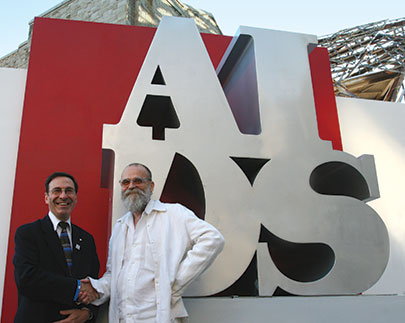
Wainberg with artist A.A. Bronson at the Royal Ontario Museum's unveiling of an AIDS sculpture by the Canadian arts collective General Idea
Linda Dawn Hammond
None of this was what the young Mark Wainberg expected the life of a research scientist to be like. Born in 1945, he grew up in a secular Jewish family in Montreal, attending Outremont High School before gaining an undergraduate degree from McGill and a doctorate in molecular biology from Columbia. In the late 1970s he studied HTLV-1, the first virus proven to cause a human malignancy (adult T-cell leukemia). The co-discoverer of that virus, Robert Gallo, would go on to play a major, though highly controversial, role in the identification of HIV.
Wainberg worked in Gallo's lab in Washington, DC, while on sabbatical from McGill in 1980. Two years later, the term "acquired immunodeficiency syndrome" would be coined to describe a mysterious new killer that seemed to target gay men. Gallo soon became one of the few biomedical researchers to achieve fame outside the scientific community when he was credited, along with Luc Montagnier of the Pasteur Institute in Paris, with the co-discovery of the human immunodeficiency virus. Gallo also led the first team to prove that HIV causes AIDS.
Few doubt his genius, but many have questioned his methods. It now seems clear that Gallo used some of Montagnier's key findings without giving the French scientist due credit. A poisonous rivalry between the two men cast a large shadow over AIDS research for years. In a book review he wrote for the Montreal Gazette in 2002, Wainberg admits that "history will probably judge [Gallo] to have been guilty of excessive zeal in the pursuit of scientific glory," adding that Gallo's contributions to our understanding of AIDS have been enormous.
Scientific successes
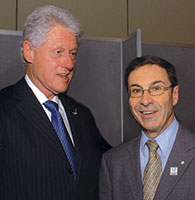
Wainberg with former U.S. president Bill Clinton at the International AIDS Conference in Toronto in 2006
Courtesy of Mark Wainberg
After Wainberg returned to Montreal from Washington, he received cells, antibodies and other material from Gallo, enabling him to become the first Canadian researcher to grow HIV in a controlled setting. A major breakthrough came in the late 1980s, with his identification of the anti-viral properties of a drug popularly known as 3TC. Wainberg is quick to praise the work of the late Bernard Belleau, a brilliant organic chemist who was a McGill professor for many years before he co-founded the company BioChem Pharma. Belleau first synthesized 3TC; Wainberg proved it could be highly useful for patients suffering from HIV. Today 3TC, used in concert with other anti-HIV medications, plays a pivotal role in delaying many of the debilitating symptoms associated with AIDS — notably its ravaging effects on the immune system.
Wainberg continues to be active on the research front. A study he co-authored earlier this year that examined HIV infection rates among Montrealers underlined the urgent need to continue public awareness campaigns focused on AIDS. Half of the newly infected HIV carriers chronicled in the study had engaged in sexual relations with partners who had themselves been recently infected and did not realize they were carrying the virus. "We know from experience," Wainberg says, "that people who know they are HIV-positive are usually prepared to modify their high-risk behaviours."
The virus continues to take a major toll. Wainberg was among the first AIDS researchers to sound an alarm when HIV, which mutates at an alarming rate, swiftly proved resistant to many drug therapies. He has also worked on ways to prevent HIV infection in poor countries, such as vaginal microbicides. But 3TC remains the accomplishment which he looks back on with the greatest pride: "That work has contributed directly to the saving of millions of lives. Who could ask for anything more?"
"What has always impressed me about Mark," says his McGill colleague Dr. Marina Klein, an assistant professor of medicine, "is his clear and unwavering support for the conduct of quality research that aims to make a global difference in the HIV epidemic. He never shies away from controversial issues simply because they are not politically correct, but rather addresses problems head-on, armed with scientific evidence that provides him with a certain moral authority."
Klein, MDCM'91, MSc'01, adds that Wainberg is also a wonderful mentor. "He is a tremendous supporter of young scientists — few researchers of Mark's stature will take the time that he does to discuss science or offer concrete collaborative support to junior faculty and students."
Given the tough challenges facing many Canadian scientists, that support is surely appreciated. Most of the general public, Wainberg says, "has no appreciation of the pressures you come under when you need to compete for grants" — nor any idea of how much time goes into the preparation, writing and editing of detailed grant applications. Medical research is very expensive, and the stresses on researchers are magnified because less than 20 per cent of applicants to our major funding body, the Canadian Institutes for Health Research, succeed in winning grants. "It's not a healthy thing," Wainberg remarks, "in terms of the researchers' families. Or their self-esteem. If you're successful, chances are you've got incredible willpower."
The funding pressure may well discourage a lot of young Canadians from choosing a career in pure science. Wainberg says that it also has an impact on the public at large. The quality of our medical schools depends partly on the excellence of research being conducted by the faculty. An environment that is academically stimulating helps to produce better clinicians — and better patient care.
Unlike many scientists, Wainberg does not look on writing as a burdensome chore (he talks enthusiastically about such present-day novelists as Ian McEwan and Vikram Seth). He enjoys seeing articles into print, he never tires of travel and — as a professor of medicine, microbiology and immunology — he loves working with graduate students. However, Wainberg also serves as the director of the McGill University AIDS Centre and as director of research at the Jewish General Hospital. Even though he tries to delegate as much as possible, he still has to spend about one day a week on administration. It's a task, he frankly admits, that he hates. He would much rather use the time on research.
Thanks, in part, to $2-million from the Canada Foundation for Innovation, Wainberg and his colleagues can now work in a high-security HIV/AIDS bio-containment laboratory recently constructed at the Jewish General. The $5-million facility is equipped to carry out research related to how HIV/AIDS patients respond to different medications and how HIV becomes resistant to drugs that have been developed to combat it. Wainberg also plans to use the lab to train researchers from Africa, the continent that continues to be hit hardest by AIDS.
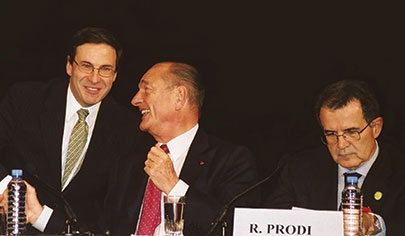
Wainberg with then-French president Jacques Chirac and then-European Commission president Romano Prodi at the International AIDS Society Conference in Paris in 2003
Challenges ahead
Compared to a decade ago, the life of most AIDS patients in a wealthy nation like Canada has radically improved. "The drugs are wonderful," Wainberg says, "and getting better all the time. They have transformed what used to be a death sentence into a manageable chronic condition. Unfortunately, this fantastic progress has not been possible for most people living with the disease in developing countries. I'm very adamant about wanting to make that happen." Even now, the number of people who die from HIV/AIDS each year exceeds the number who have access to life-saving medications. This is, of course, a political issue rather than a strictly medical one.
In his efforts against AIDS, Wainberg has relied on his political instincts as well as his scientific acumen. "Mark contributed singularly to the recognition of the African AIDS epidemic and, more importantly, to the deployment of highly active antiretroviral therapy programs in the south of the world," says Dr. Julio Montaner, president-elect of the International AIDS Society.
According to Montaner, Wainberg was determined to hold the 2000 International AIDS Conference in Durban, South Africa, seeing it as an important opportunity to demonstrate to the world the enormous impact AIDS was having in Africa. It was the first time the event was held in a developing country. "At one point, this was felt to be a rather risky if not dangerous move," says Montaner. "Mark proved the world wrong when the conference turned out to be a tremendous success." Montaner describes Durban as "the pivotal event" that paved the way for antiretroviral therapy efforts in Africa.
Wainberg does not expect HIV to be the last virus to wreak unexpected havoc on our society. "There was very little way to predict the emergence of the AIDS virus," he points out. "And if it happened once, why can't it happen again? We got a good scare a few years back with SARS, and we all fear another influenza pandemic. But it would be complacent to imagine there won't be other viruses too."
HIV remains an astonishingly baffling virus. Researchers keep looking for a pair of holy grails: a cure and a vaccine. "We know how to treat the disease," Wainberg says, "but we don't know how to cure it or prevent it. In fact, we have no right to speak of a possible cure — the science is just not there yet. We also have no right to promise anybody that we'll have a preventive vaccine within the next 20 years." He glances meaningfully over his glasses. "I hope I'm wrong."
Few researchers would speak so plainly. But plain speaking has served Wainberg well. On the day he met Daniel Arap Moi, for instance, the Kenyan president was polite; having listened to Wainberg's forthright words, he made no promises. Yet in the months after that meeting, Moi's government finally began a major campaign of public education about HIV and AIDS — just as Wainberg had hoped, and just as the priest in the airport had feared.
Mark Abley is a Montreal-based author, poet and journalist. The winner of a National Newspaper Award and a Guggenheim Fellowship, Abley wrote Spoken Here: Travels Among Threatened Languages, a Discover Magazine Top 20 Science Book of the Year. He is a columnist for the Montreal Gazette and the Toronto Star.


